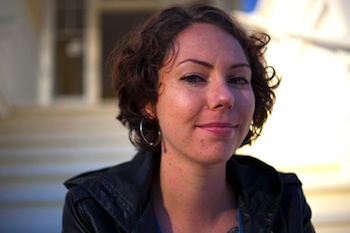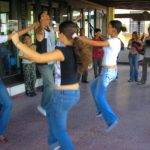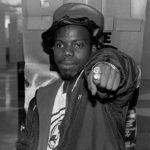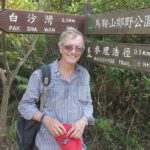Lauren Quinn is a writer, editor, traveler, and former expat. Her work has appeared in Guernica, The Guardian, Vela, Best Women’s Travel Writing, and The Best American Travel Writing 2015. She is currently teaching middle school in Los Angeles.
How did you get started traveling?
My first big trip was to South America, the summer after I graduated from college. I’d never been out of the country. In fact, I’d been pretty nose-to-the-grindstone in college, working two jobs while taking full-time classes and earning straight A’s. So taking a trip at all was a big deal, let alone a one-monther to another continent. I was nervous and excited and anxious. I remember so clearly riding in the taxi from the airport in Lima, the sun coming up and all the morning bustle starting, and thinking to myself, “Oh, this is it? I can totally do this!” And I did. I came home from that trip and proceeded to spend the next ten years working, saving and buggering off to another country every chance I got.
How did you get started writing?
I’ve always written; it’s really just the medium that’s changed. As a little girl I wrote serial novellas, basically blatant rip-offs of Babysitters Club. In my teen years I transitioned to moody, melodramatic confessional poetry, making zines and performing in literary events around the Bay Area. I studied poetry in my undergrad, but shortly thereafter the poetry well dried up — I just couldn’t write it anymore. I had a few dark years of not writing anything, before it slowly began to occur to me that I (a) liked traveling, and (b) liked writing, and that I could (c) combine these things to actually make a little money. I started tinkering around, started a blog, went to the Book Passage Travel Writers Conference, and had the same experience I had in that taxi in Lima: “Oh, I can totally do this!” There was obviously a lot of hard work involved and a lot of craft to learn, but my background in writing gave me the confidence that I believe I could do travel writing.
What do you consider your first “break” as a writer?
My first, first break was getting a first-person narrative published in a local weekly, East Bay Express, when I was sixteen. I didn’t really write personal narrative at the time, but it got a great reaction and the editors actually published a second piece of mine. I don’t know why I didn’t write more personal narrative after that, since it was such a hit and no one really likes (or publishes!) poetry, but it took me about ten years to come back to that form.
As a traveler and fact/story gatherer, what is your biggest challenge on the road?
My biggest challenge used to be staying so glued to my own self-imposed itinerary that I’d miss really great opportunities, stories and characters. I’d be so focused on what I thought I needed to see and do that I wouldn’t see what was actually going on around me. Then it swung the other way: after I’d become an expat, I became super blase and never traveled with an itinerary, totally just winged it every trip. Which meant I wasted a lot of time sitting at cafes, waiting for something cool to happen and not sure what to do with myself in the meantime. But I also ended up in weirder places and got better stories that way. It just took longer.
I’d say my other big challenge is being a woman. There’s so many chances and opportunities I don’t take, because I always have consider my safety. It’s so much a part of my life experience that I sometimes forget that men don’t have to always be gauging people and situations for levels of danger. I usually travel alone, which I love, but it means I can’t always just go off with that awesome-seeming stranger I’ve just met. I have to be a lot more cautious than my male counterparts. I was recently watching an Anthony Bourdain episode in which he said that the best way to travel is to find where the local men are drinking and start talking to them. Which is horrible, horrible advice for anyone of the non-male gender. At the same time, I think being a woman has given me an entirely different experience and perspective on travel and places, one that you don’t always get to hear (I’m thinking of my writing about Cambodia), and I’m really grateful for that. I wouldn’t trade it, but it is a constant challenge.
What is your biggest challenge in the research and writing process?
I’d say trusting the process. A lot of good writing takes time — you’ve gotta do a ton of research and dig around and get out there, but then you also need time to let it sit in you and percolate. The best things I’ve written are the things that I’ve let sit for six months, sometimes over a year. There’s a lot of pressure to publish fast, to keep your name relevant, to insert your voice into different conversations — and for me the biggest challenge is to really sit with a piece of writing and ask what it wants to say, rather than what I want it to say. I often have to put pieces away for a long time and trust that when I revisit them, I’ll know what to do. This has gotten a lot easier now that I’m not pursuing writing as a career, now that my finances and identity aren’t tied up in what, where and when I publish.
What is your biggest challenge from a business standpoint?
The whole thing! Seeing as though I’m no longer pursuing a career as a writer, you could say I wasn’t very successful with the business side of things. Part of it is just that it’s a really hard industry in which to earn an actual living: a lot of publications want you to write from exposure (read: no money), and even once you break into the realm of earning money, there’s really just not a lot of it. I always had another gig going that paid in the majority of my bills. I was only a full-time freelancer for six months, and quickly discovered that I wouldn’t able to be self-supporting on writing alone, even living in Phnom Penh. That being said, I was able to write off a lot of my traveling tax-wise, so there was definitely a benefit in that department. But relying on writing for “business” never worked for me.
Have you ever done other work to make ends meet?
I was very lucky in that I was already working in restaurants when I started travel writing. So I’d worked my way up into really great restaurants where I earned good money and had lots of flexibility to travel, and I actually enjoyed the work. I gave that up to move overseas and pursue a writing career full-time. But after six months of that, I started teaching a few hours a week, just to have a consistent source of income. I discovered that teaching was a much more time-effective way to earn money, and that having that income freed me up to write pieces I really cared about, versus tons of top-10 lists which weren’t what I wanted to write anyway.
What travel authors or books might you recommend and/or have influenced you?
I’m pretty bad in this department as well. I never got in to much official travel writing, save for Tim Cahill. I think this is because most of the travel writing by women doesn’t resonate with me — it either feels too willowy and weepy, or like it’s trying too hard to sound like the guys. Most of what I read that influenced my travel writing was personal narrative, which sometimes intersected with travel but mostly was driven by character rather than place. I was really influenced by the boom of personal essays that was occurring online at the time, on sites such as The Rumpus, Salon, Guernica and the like. These days I find a lot of great personal narrative on Hazlitt, Midnight Breakfast, even Buzzfeed. What I like about these sites is that they really strive to represent different voices and perspectives, the stories of people existing outside the mainstream, which is probably another reason that a lot of travel writing didn’t resonate with me: it’s pretty well dominated by white dudes. Not that there’s anything wrong with that, but you get tried of reading stuff from the same perspective. In terms of non-fiction writers, I’m a fan of Jo Ann Beard, Ashley C. Ford, Thomas Page McBee, Michelle Tea, early Lester Bangs, and of course Joan Didion. And you can’t escape the cultural phenomenon that is Roxane Gay. Or Lena Dunham for that matter — her craft is pretty excellent. The first non-fiction I ever got into was Jim Carroll’s The Basketball Diaries, which isn’t so strong in terms of craft but blows the lid with the force of voice.
What advice and/or warnings would you give to someone who is considering going into travel writing?
Do it for the love! Seriously. For me, it didn’t work to have my identity and finances wrapped up in Being A Writer. It worked far better to derive those things from other sources, and to write just for the writing. There’s a lot of privilege in being able to do that, since it assumes that you can make your money elsewhere and still have the freedom to both write and travel. But when you’ve gotta make your living as a writer, you have to worry about branding, about writing what’s sellable, about making your voice marketable. Some folks are lucky in that what they have to say happens to be what publications want to buy, but for most folks, there’s an element of losing or editing yourself involved. That really didn’t work for me.
There’s a story I heard once, back when I was a teenager and doing a lot of performance poetry, that probably ended up being the most powerful advice I ever heard. Wyton Marsalis was talking about being a teenager, a young trumpet prodigy, and playing this horn trick he’d learned at a show. It was something that wasn’t actually that difficult, but that uninformed audiences would go crazy for. Which is exactly what his audience did: standing ovation, praise after the show, all that. But on the car ride home, his dad was really quiet. He finally turned to Wyton and said, “Son, if you play for applause, that’s all you’ll ever get.” That’s a line I’ve always come back to, both in my writing and in my life. So I’d say to someone starting out, get really clear on why you’re doing this, and don’t lose sight of it.
What is the biggest reward of life as a travel writer?
Man, it’s in those little moments, those incredible moments when you have some sort of connection or get into some crazy adventure, and you feel the possibility in everything, the pulse inside and underneath of everything, and like you’re in conversation with it. Which sounds really far out and hippie-ish, but I think if you’ve been there, then you know what I mean. Being a travel writer gave me an excuse to do all sorts of stuff I’d never otherwise have done, like fly to a random town in Southern Italy for a DIY art festival where I ended up meeting someone who’s become a life-long friend. Or deciding to take a wooden boat through a limestone cave in bumfuck Laos and spend four days in this remote village, eating foraged frog and trying to bathe in a sarong (not successful). It’s all the cool stuff I’ve gotten to see, and the good people I’ve gotten to meet, the way it’s expanded my idea of what it means to be alive in this world. I wouldn’t trade that for anything.





